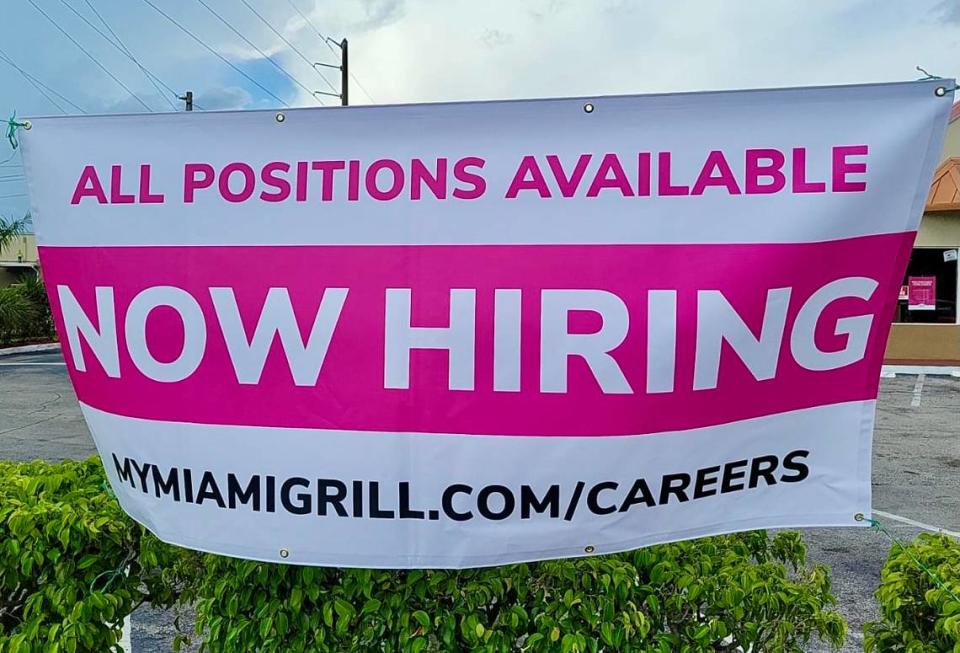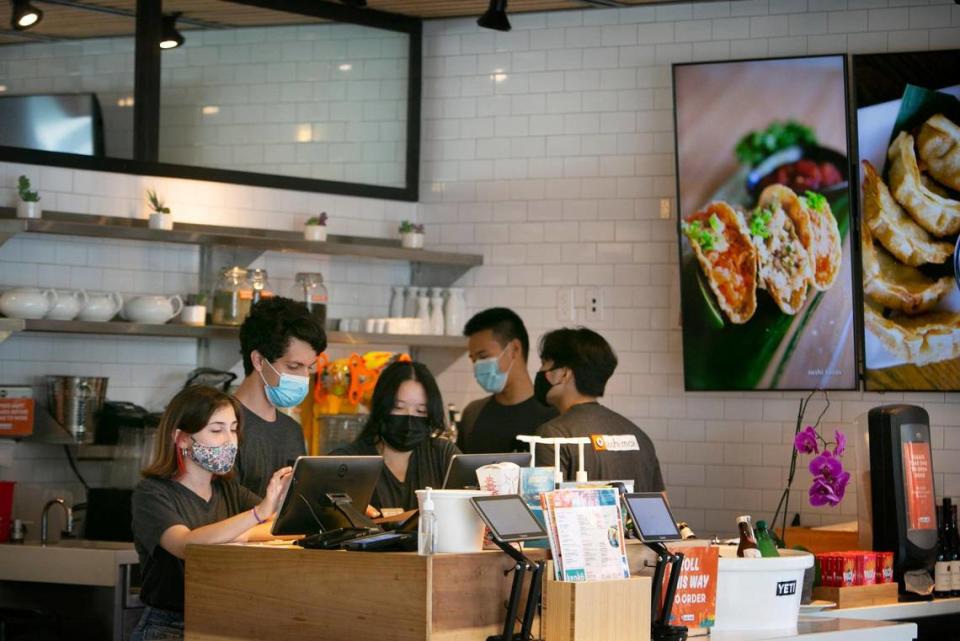For teens, finding a summer job was nigh impossible. Things have changed
Nineteen-year-old Little Havana resident Lucas Blanco had never worked a summer job before. But he needed some extra cash.
Lucky for him, Azucar ice cream shop owner Suzy Batlle needed workers. Fast.
“I would be willing to hire anyone capable of serving an ice cream,” Batlle said.
So despite his only ice cream experience being a familiarity with Azucar’s famed eclectic flavors, Blanco is now working as a scooper at the stalwart Calle Ocho parlor, making above minimum wage (he and Batlle declined to say how much), until he returns to college in Tennessee in the fall.
Faced with an unprecedented labor shortage sparked by the COVID-19 pandemic, South Florida restaurants are increasingly turning to high school and college students to take shifts. It’s a trend seen nationwide — where the unemployment rate for 16- to 19-year-olds stands at 9.6%, the lowest it’s been since 1953 — but one that is now especially noticeable in the hospitality-heavy Miami metro area.
“That’s who I’m hiring now,” said Batlle. “They’re trainable, thank god.”
The trend stands in contrast to a decades-long pullback in teen hiring, something economists have attributed to a multitude of factors including increased enrollment in school, and a decline in entry-level jobs. During the pandemic, teen summer employment hit its lowest point since the Great Recession, according to a Pew study.
But this summer, local hospitality captains say, teens searching for a job should be able to find one. Across the Flanigan’s Seafood Bar and Grill chain in South Florida, about 50% more teens are working this summer than in summers past, said Flanigan’s owner Jimmy Flanigan.
“Because we knew we were short-staffed, I made sure I reached out to my kids’ friends and their parents.” Flanigan estimated he personally hired at least 10 youngsters for summer roles, usually in the front of the restaurant, like hosts and bussers.
Economists are still not entirely certain about the cause of the labor shortage. While there is some evidence that generous unemployment benefits have kept some workers sidelined, other causes, like skills mismatches, too-low pay, retirements, and ongoing fears of exposure to the virus have also made it difficult to hire, especially in hospitality.
For now, teens are benefiting — including ones in South Florida. Data from payroll software provider Gusto show teens have been making up a record portion of new hires in the Miami metro area. In June 2019, 15- to 19-year-olds made up 15% of all new hires; this June, they made up 49% — nearly half of all new employees.
And they’re earning more, too. In the metro area encompassing Miami, Fort Lauderdale and West Palm Beach, wages for 15- to 19-year-olds in service-sector jobs have increased from $8.43 a year ago (June 2020) to $10.66 (June 2021).
Teens can now expect to earn above the minimum wage, according to the restaurateurs interviewed. Flanigan said one young hostess was making about $1,600 over two weeks.
“Even if they’re coming to work for Flanigan’s, we have to be mindful that Chili’s can also pay them like us,” Flanigan said. “Wage inflation is real.”
AnnElizabeth Konkel, an economist with jobs website Indeed, said this summer is a prime opportunity for teens looking to gain work experience.
“There’s elevated demand for workers, with some employers hiring urgently and offering hiring incentives,” she said in an email. “Teens are already taking advantage of employers’ tightening demand for workers.”

South Florida fast-food chain Miami Grill has seen a surge of teen applicants this summer. Partner and Chief Operating Officer Jonathan Vogel said he has never experienced such difficulties hiring in his 33 years in the restaurant industry. As a result, while some owners often hesitate to hire minors because of Florida’s strict work laws governing them, such concerns are being cast aside to meet the current challenge.
“Now more than ever [teen workers] are serving as a bridge to help us until the labor market crunch eases up,” Vogel said.
Still, those work laws are strictly enforced by Florida’s Department of Business and Professional Regulation. Michael Elkins, a labor law attorney and founder of MLE Law in Fort Lauderdale, said there are different work hours allowed for different age groups: one set for minors aged 15 and younger, and another for minors aged 16-17.
All minor workers in Florida are barred from working for more than six consecutive days a week, with no more than four continuous hours without a 30-minute break period.
Elkins said he recently resolved a dispute for a client who had employed a minor to cover a shift in a pinch.
“They’re out there enforcing,” Elkins said of DBPR officials. “That’s how my client got hit. An investigator popped in and they got dinged.”
Flanigan said teen schedules “are always interesting” because they are often traveling or enrolled in summer classes or participating in extracurricular activities — or all of the above.

Abe Ng, owner of Sushi Maki, said each of his six open restaurants in Miami-Dade now has at least one or two college- or high school-aged workers. Some are interns in white-collar roles who Ng believed would benefit from exposure to the restaurants’ everyday workings.
“A shift here, a shift there makes all the difference in the world,” he said.
Ng said occasionally the youngest workers need extra training. Patrons, he said, are forgiving.
“They know how challenging things are right now,” Ng said of summer diners. “People have been patient and are working with us.”
This story has been updated to correct Michael Elkins’ title and law firm.

